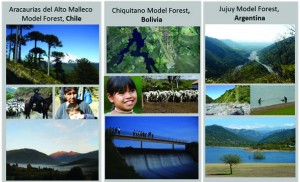Congress Spotlight #73 – A Quest for Fairness in Forest Management Decisions: Integrating Indigenous Rights, Practices and Knowledge
Congress Spotlight #73 – A Quest for Fairness in Forest Management Decisions: Integrating Indigenous Rights, Practices and Knowledge
“The practices, rights and knowledge of Indigenous Peoples in forestry are being increasingly recognized by national policies, international treaties and by business arrangements such as certification,” said Dr. Stephen Wyatt of the School of Forestry at the University of Moncton in New Brunswick, Canada.

“But,” he said, “actually putting these into practice is challenging.”
Read more…On Forest Policy and Economics
IUFRO All-Division 9 Meeting at the 125th Anniversary Congress
An Interview with Division 9 Coordinator Daniela Kleinschmit, University of Freiburg, Germany
—– Read more…
IUFRO Spotlight #36 – Responses to climate change? All knowledge counts!
 EcoAdapt aims to enhance local communities’ engagement in innovative solutions to climate change adaptation.
EcoAdapt aims to enhance local communities’ engagement in innovative solutions to climate change adaptation.
The project, a joint undertaking by four research and five civil society organizations from Europe and Latin America, was initiated in 2012 and is being financed by the European Union for a four-year period.
Its overall objective is to develop ecosystem-based strategies for adaptation to climate change in three Latin American Model Forests – in Bolivia, Argentina and Chile. Read more…
The Nairobi Resolution
“Forest and Trees: Serving the People of Africa and the World” was a fitting theme for the 1st IUFRO-FORNESSA Regional Congress & ITTO/AFF Forest Policy Day held at the World Agroforestry Centre in Nairobi, Kenya June 25-29. The closing ceremony held late Friday afternoon after the last of the Scientific Sessions adjourned, brought reflections of the week and outlined the importance it had for the region and its people.
Adopted from the discussions and the sessions held throughout the week, The Nairobi Resolution was read allowed to the 350+ scientists, policymakers, and forest stakeholders in attendance at the Congress. The resolution which comes a week after the Rio+20 Sustainable Dialogue on forests reinforces the commitment of African countries to “promote science, technology, innovation and traditional knowledge in order to face forests main challenge: how to turn them productive without destroying them”.
The participants of the Congress voiced 7 commitments for the future:
- Adopt people-centred approaches for forest research and education focusing on environmental, social and economic pillars;
- Further expand the scope of forest research, training and education to address issues relevant to global sustainability including land use, livelihoods and environment issues;
- Increase information sharing and knowledge management through fostering regional cooperation and networking in African forest research and providing opportunities for scientists to contribute to global issues;
- Combine traditional knowledge with formal scientific research results to design forest and tree management systems to meet local and broader societal needs at varying spatial scales;
- Develop reward systems for successful uptake and adoption of research outputs and build impact analysis in the research project design;
- Invest in science-society communication, including the training on effective communication of research findings, to improve the impact of research for all beneficiaries and improve the link between research, policy and practice; and
- Provide effective platforms for engagement of scientists, policy makers and stakeholders through national, sub-regional and regional mechanisms.
In a region that faces many obstacles using forest and trees to meet local livelihood needs while ensuring a biodiverse and environmentally sustainable landscape the resolution outlines an optimistic future for Africa – it’s forests, it’s trees and it’s people.
Read The Nairobi Resolution in its entirety at https://www.fornis.net/content/nairobi-resolution.
PDF at http://www.iufro.org/download/file/8798/3684/regcong-africa12-congress-resolution_pdf/

